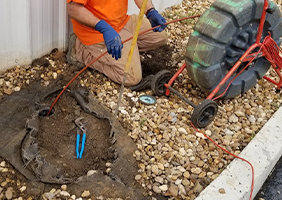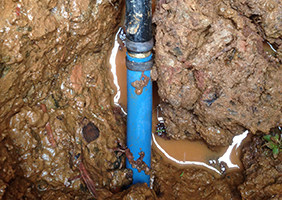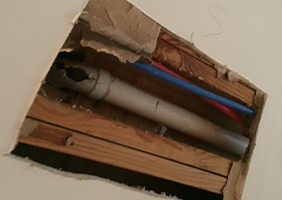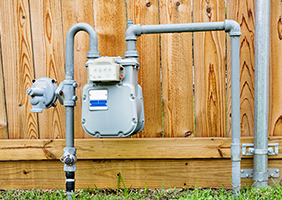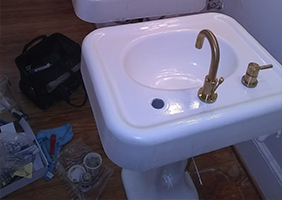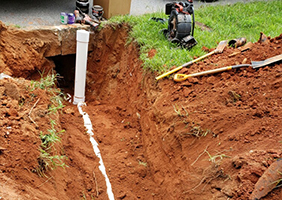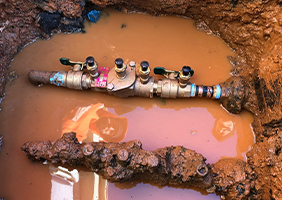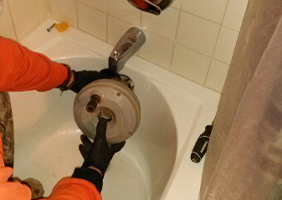ATLANTA
WATERLINES
Get professional water line services throughout the greater Atlanta metro area.
- Residential & Commercial
- Emergency Water Line Repair
- Water Line Replacement
- Polybutylene Replacement
- Full-Service Plumbing
Atlanta waterlines
A reputable plumbing company in Atlanta
Atlanta Waterlines is a plumbing company in Atlanta with over 25 years of experience in this field. Our plumbers can handle almost every type of plumbing job. We can resolve plumbing issues in both residential and commercial properties. Our services include drain repair, emergency plumbing, water heater repair, and sewer line installation, among others.
Atlanta Waterlines is one of the best plumbing companies in Atlanta. It is a fairly obvious fact that no one likes puddles of water and leaking pipes in their homes. Plumbing is essential for both commercial and residential buildings.
It ensures that water flows in and out of the house properly. Plumbing is not limited to water-related services. It also involves the maintenance and installation of water heaters, detecting leaking pipes, resolving clogged toilet and sink issues, and installing new water pipes.
All these things require only experienced plumbing companies whose plumbers are trained enough to solve any plumbing problem. If you live in Atlanta, you need an emergency plumber in Atlanta. Waterlines is just the right choice for you.
Why are we the Best Plumbers in Atlanta?
At Atlanta Waterlines, we strive to deliver exceptional service from the initial phone call to the final handshake. Before booking any plumbing company in Atlanta, you should be well aware of the company’s working methodology. Like other plumbing companies, we do not believe in scaring our customers by finding minute problems in their homes to make more money. This is never a part of our plan.
Our plumbers in Atlanta discuss the entire problem with our customers fairly and then provide them with the total cost of the task. We arrive quickly at the location as soon as our customers call us. We then assess the problem carefully and guide our customers fairly. We do not believe in putting a financial burden on our customers with unnecessary charges like other plumbing companies.
Our company values time the most. We are sensitive to our customers’ timelines. Our agents provide a proper time slot to our customers and guide them at every step. We believe in proper communication, and any changes in the time slots are informed to our customers beforehand. If your time is essential to you, it is vital for us too.
If you are at all bothered by the service, then do not worry. This is because we are one of the most renowned plumbing contractors in Atlanta. Our partnership with other subcontractors enables us to source a wide range of sheet metal and raw materials for plumbing, giving us a competitive edge over other companies. In addition to that, we have more than 6 decades of experience in plumbing repair in Atlanta, which is why our brand is reliable and here to stay. We are committed to consistently exceeding our clients’ expectations throughout every project we undertake.
Finding reliable and experienced plumbers in Atlanta is a challenging task. However, at Atlanta Waterlines, we prioritize customer satisfaction above all else. We ensure that we perform our job efficiently and keep our customers satisfied.
We have highly skilled technicians, high-quality tools, and well-stocked trucks. Our plumbers are well-behaved and presentable at both home and on the road. We have a back office where you can call anytime to discuss the plumbing issues or book an appointment. Our expert technicians will give you free advice on all plumbing-related problems, and above all, we give free estimates on the phone.
We also offer emergency plumbing in Atlanta.
RECENT ARTICLES
-
How to Find an Atlanta Plumber
If you need to find an Atlanta plumber service, we provide you with the right service, call us today to…
-
Your Guide to Georgia Plumbers
Providing you with a Plumber in Georgia, there are many other service that we offers including: doing home renovations for…
-
Atlanta Sewer Problems
Let us help you find your Atlanta sewer problems, there are many service that we offers including: doing home renovations…
-
Atlanta Piping Services
We provide fast, friendly professional Atlanta piping services and we offer the finest plumbing service and for all your plumber…
What to Expect From Us?
Primarily, our plumbing service is available 24 hours a day, so you can call us whenever you need us. Before starting any plumbing job, we provide our customers with a detailed estimate of the cost, enabling them to make an informed decision about what is best for their needs.
We offer excellent services at affordable prices, which is why we are one of the best plumbing companies in Atlanta.
We are not only a licensed plumbing company in Atlanta, but we also have trusted and certified plumbers who consistently deliver exceptional work. We can handle a wide range of jobs, from simple faucet repairs to complex water heater installations, very easily and quickly.
We Offer Our Services Throughout The Greater Atlanta Metro Area
-
Acworth Plumbers
-
Alpharetta Plumbers
-
Avondale Estates Plumbers
-
Bremon Plumbers
-
Buckhead Plumbers
-
Canton Plumbers
-
Carrollton Plumbing
-
Cartersville Plumbers
-
College Park Plumbers
-
Columbus Plumber
-
Crawford Plumber
-
Cumming Plumbers
-
Decatur Plumbers
-
Donalsonville Plumber
-
Doraville Plumbing
-
Douglasville Plumber
-
Duluth Plumbing
-
Greensboro Plumbers
-
Hartwell Plumbers
-
Lawrenceville Plumber
-
Lexington Plumbers
-
Lilburn Plumbing
-
Lithia Springs Plumber
-
Loganville Plumbers
-
Macon Plumbers
-
Marietta Plumbing
-
Metro Atlanta Plumbing
-
Monroe Plumbers
-
Mount Vernon Plumbers
-
Norcross Plumbers
-
North Decatur Plumber
-
North Metro Atlanta Plumbing
-
Oxford Plumbers
-
Pine Lake Plumbers
-
Powder Springs Plumber
-
Rome Plumbing
-
Roswell Plumber
-
Smyrna Plumbing
-
Snellville Plumber
-
Social Circle Plumbers
-
Stockbridge Plumbing
-
Suwanee Plumber
-
Tucker Plumbing
-
Villa Rica Plumbers
-
Vinings Plumbing
-
Winder Plumber
-
Winston Plumber
-
Winterville Plumbers
-
Woodstock Plumbers

